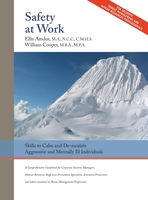 | Individuals suffering from psychiatric or substance use disorders sometimes display any one of a number of frightening behaviors: verbal outbursts, physical threats and even violence. In this comprehensive guidebook, Ellis Amdur and William Cooper are speaking to people in two areas: human resources and threat management professionals, who work in the area of worksite security: ordinary individuals in every walk of life who may face an aggressive or emotionally disturbed individual. This book outlines a multitude of steps that people can take to keep themselves, their colleagues, and their clientele safe. Download PDF of Table of Contents and read 1 chapter |
||
Ebook  | Ebook  | Ebook, Audiobook & Paperback  | Audiobook |
The first section of the book are specific to “systems issues” – what are the criteria necessary for establishing a safe worksite. This is equally valuable for those employed in threat management positions and those not: for you in the latter role, you can use this to evaluate your own worksite to see if all those working there are as safe as possible. Effective policy change, when necessary, comes from knowledge, and this book will surely provide this.
In the second major sections, the authors focus on us: what we can do to achieve a state of integrity and powerful calm. Rather than abstract pronouncements, they offers specific strategies, including a method of breathing that is for the purpose of maintaining one’s center in crisis situations.
The largest portion of the book discusses specific behaviors ranging from such relatively minor irritants as reluctance to complete tasks and obsessive concerns to more troubling, pervasive syndromes such as psychosis, mania and disorganization. In one very important set of chapters, they discuss interactions with individuals with opportunistic and manipulative traits, people who may present danger to the psychological and physical well being to anyone they encounter.
Strategies concerning the de-escalation of aggressive individuals are specific — one learns how to instantly recognize what mode of aggression the person is in, and then, well-trained and practiced, one can almost instantaneously shift into the correct de-escalation tactic that fits the aggression one is facing.
A review of this book states: “Safety At Work is a clear and concise look at a variety of different behavioral challenges that one may face in the workplace. The book outlines strategies for handling each kind of challenge with a strategy of maintaining safety while doing all that one can to de-escalate a potentially violent situation. “Safety At Work” is an absolute must have for Executives, Managers, HR, and Corporate Security staff.”
